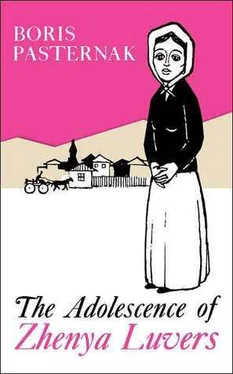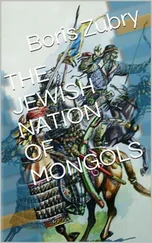Boris Pasternak
THE ADOLESCENCE OF ZHENYA LUVERS
Boris Pasternak first achieved fame, both in his native Russia and abroad, as a lyric poet. His father was a well-known painter, while his mother was a talented pianist. He studied music for some years, then philosophy at the Universities of Moscow and Marburg. He joined the Cubo-Futurists in 1912, but was only associated with them briefly, and, except for his interest in obscure words and his occasional use of shocking or vulgar imagery, he had little in common with the Futurists. His first collection of poetry, A Twin in the Clouds, was published in 1914. He won wide recognition after the First World War with a collection of lyrics called My Sister Life, written in 1917 but published only in 1922. With the publication of successive collections, he soon acquired the position of the leading younger poet of Russia. His Spektorski (1926) is an attempt at treatment of certain episodes of his own life. As a narrative work, it was somewhat less successful than his lyrics, as were his other narratives, 1905 (1925-26) and Lieutenant Schmidt (1926-27), both attempts to celebrate the revolutionary movement in Russia. Pasternak aims at a personal, lyric verse, and the revolutionary movement is a subject which seems alien to his real interests. His collection The Second Birth (1932) frequently employs the Caucasus and its magnificent landscapes as a setting, and these poems, like others by Pasternak, sometimes recall Lermontov’s Caucasian poetry.
Though Pasternak’s poetry is difficult and at times obscure, he became the favorite poet of Soviet intellectuals, and there is little doubt that he is one of the leading poets of our time. The obscurity of his work, its individualism and concern for personal subjectivity made much of his work unacceptable to orthodox Soviet critics, who attacked him for “formalism” and “alienation from the masses.” Apparently driven from original creation by the hostile pressure of his critics, Pasternak turned to translation, producing excellent versions of several of Shakespeare’s plays as well as selections from American and Georgian poets. He took advantage of the somewhat more lenient atmosphere of the time of the Second World War to publish two new original collections: On Early Trains (1943) and The Terrestrial Expanse (1945), which show a certain simplification and greater directness by comparison with his earlier work. But in 1946 the critics launched a new attack, and thereafter he published no poetry except in translation.
As a poet, Pasternak was highly individualistic. Philosophical themes and the contemplation of reality were favorite subjects, along with the more conventional themes of love and nature. Nature in his poetry appears as new and strange; the poet describes her almost animistically as alive, and re-creates for us something of the elemental wonder of a primitive view of the world. But Pasternak’s “primitivism” is actually part of a sophisticated but deliberately irrational approach to nature, which he depicted in strikingly rich and novel images. He is unusual as a lyric poet whose poetry tends to be prosaic in its great use of synecdoche and metonymic imagery, of part-whole and object-symbol relations. His metaphors and similes are especially remarkable in their freshness, and he was not in the least afraid to use images of objects which are of a technical nature, or are prosaic or even vulgar. Thus, he compares the guilt of a lover to a skin infection, or the color and feel of fresh air to a bundle of wash taken home from a hospital. Images of sound are particularly striking in his poetry, as when he speaks of the “clatter of winter” or the “rumble of grief.”
Pasternak’s prose is an extension of his poetry, with the same prosaic quality and the same unexpectedness of imagery. In 1925 he published his only collection of stories, in which appeared the present work, The Adolescence of Zhenya Luvers. The story is virtually plotless, full of reminiscences which Pasternak “objectivizes”; a young girl’s reactions to the world about her seem to become part of that very world. Another story is Air Ways (1925), set against the background of the 1917 Revolution, depicting in a fragmentary and quite unsentimental manner a father’s inability to save his illegitimate son, arrested for taking part in a counterrevolutionary conspiracy. But the story as such is less important than its imagery. Safe Conduct (1931) is an autobiographical account of the poet’s youth and early spiritual development.
Pasternak has been compared to a number of modern poets, including Eliot, Hopkins and Rilke. More than they, however, he is a writer whose subject was a new manner of perception, a manner far more important than what is perceived or what is believed. It is the fresh way of perceiving reality which is original in his work. During the 1920’s Pasternak had considerable influence on a number of young Soviet poets, including Tikhonov, Bagritski and Selvinski. But his influence largely waned with the attacks on his work by Soviet critics.
In 1958 a novel by Pasternak, Dr. Zhivago, appeared in Italy; subsequently the work was published in English and in many other languages. Dr. Zhivago is a lyrical novel of the life of Russian intellectuals during World War I, the Civil War and the early years of the Soviet regime. The hero is a physician and poet who reacts to the tragic happening of history by passive withdrawal and a search for freedom within himself. His love for Lara, the novel’s heroine, is a triumphant assertion of life in the face of the logic of historical events; so also is his creative work as a poet. The novel is a symbolic depiction of the spiritual death of Russia, particularly the old Russia of the intelligentsia, in the Revolution; at the end of the book the possibility of regeneration is symbolized by the appearance of Zhivago’s daughter Tanya. Marxism and Communism are sharply criticized by the author; to them he opposes a Darwinian conception of life and a Christian philosophy of history which emphasizes individual freedom. Later in 1958 the Nobel Prize for literature was offered to Pasternak; he at first accepted it, but later rejected it after he had been subjected to a storm of vituperation by Soviet critics. To date (1961) the novel has not been published in the Soviet Union. Pasternak died in 1960 of heart disease.
WILLIAM E. HARKINS
Zhenya Luvers was born and grew up in Perm. Later on, her memories were buried in the many shaggy bearskins of the house, as her little boats and dolls: had been earlier. Her father was manager of the Luviewsky Mines and had many customers among the manufacturers of Chusovaya.
The luxuriant, brown-black bearskins were gifts. The white she-bear in the nursery was like a giant, fullblown chrysanthemum. This fur had been especially chosen for “Zhenichka’s room.” It had been carefully selected, purchased in a store after long bargaining, and brought to the house by a delivery boy.
In the summer the Luvers lived in a country house on the other side of the Kama. In those years Zhenya used to go to bed early, and did not see the lights of Motovilikha. But, one night, the Angora cat, frightened in her sleep, made a violent movement and woke up Zhenya. Suddenly she saw people on the balcony. The alder tree which overhung the balcony railing was iridescent like thick, dark ink. The tea in the glasses was red. The men’s cuffs and the cards were yellow and the tablecloth green. It was like a nightmare, but it was a nightmare with a name that Zhenya knew: it was called “a game of cards.”
But what was going on, on the other shore of the river, in the far, far distance, she could not recognize; it had no name, no definite color or clear contours. Its billowing movements had something dear and familiar about them; it was no nightmare like the one close by, which murmured in clouds of tobacco smoke and threw fresh, wind-tossed shadows on the reddish beams of the gallery. Zhenya started to cry. Her father came in and explained everything to her. Her English governess turned her face to the wall. The explanation was brief: “That is Motovilikha. You should be ashamed of yourself. Such a big girl! Now go to sleep!”
Читать дальше










